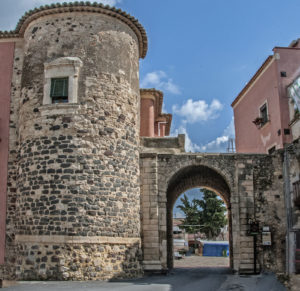During the feudal dominion of the Barresi-Branciforte family, the town of Militello in Val di Catania underwent remarkable restoration and reorganisation.
The enlightened prince Francesco Branciforte married Joanna of Austria, granddaughter of Charles V and cousin of the King of Spain, then launched an urbanisation plan to redesign the small town and adapt it to new cultural and political needs. The town’s transformations included one that involved the fortified castle, which was turned into a palace and equipped in 1612 with a well-stocked
library
, printing house and a sort of chemical laboratory.

A public fountain was later built in the castle’s courtyard.
The square of the mother church was updated in 1617 alongside the two main streets in the centre of Militello, which were widened and straightened.
Connecting roads were also built outside the former perimeter walls, which encouraged the creation of new districts.
The powerful family also promoted patronage and funded the reconstruction of the bell tower of the Chiesa Madre di San Nicolò (Mother Church of St. Nicholas) and the extension of the Church of Santa Maria (St. Mary), which became the Barresi family’s burial place in the 16th century.